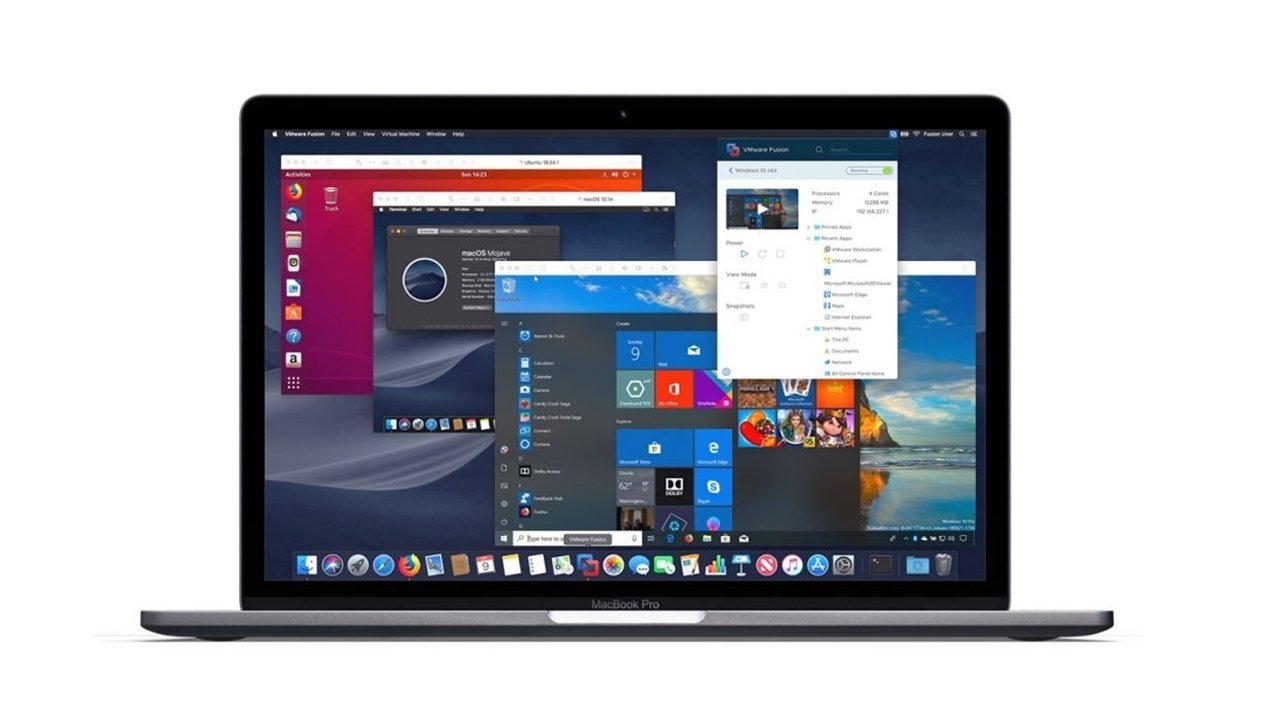VMware Fusion for M1 Macs gets private beta, official Windows support not included
VMware this week released a private beta version of Fusion for M1 Macs, though users eager to run Windows VMs on their new MacBook Air might want to look elsewhere.

Announced in a tweet from VMware Fusion manager Michael Roy, the release is officially considered a private tech preview, meaning those interested must request access to the software. A public beta is expected in about two weeks.
Details of the latest iteration of VMware Fusion were outlined in an April blog post that notes a specific focus on Linux VMs. Windows is considered a "second priority" as Microsoft does not currently license Windows 10 ARM and while Parallels feels comfortable integrating support for the operating system into its virtualization solution, VMware does not.
That said, the company is working to bring Fusion in line with Microsoft's end-user license agreement.
"VMware has had a pretty strategic partnership with MS for a long time. (see: vSphere.)," Roy said in a tweet. "I'm not sure what else I'm allowed to say other than 'we're not operating in a vacuum on this'."
As noted by MacRumors, Roy added that Windows VMs should run in Fusion as an "other" operating system alternative, but the company will not be providing first-party drivers and tools. Also not included is support for x86 Intel-based distributions of Windows and Linux, and macOS VMs are still in development.
VMware Fusion's private tech preview arrives roughly a month after Parallels Desktop 17 debuted with M1 support for ARM previews of Windows 10 and 11. Parallels says its software will provide full support for Windows 11 when the operating system launches in October.
Read on AppleInsider

Announced in a tweet from VMware Fusion manager Michael Roy, the release is officially considered a private tech preview, meaning those interested must request access to the software. A public beta is expected in about two weeks.
Details of the latest iteration of VMware Fusion were outlined in an April blog post that notes a specific focus on Linux VMs. Windows is considered a "second priority" as Microsoft does not currently license Windows 10 ARM and while Parallels feels comfortable integrating support for the operating system into its virtualization solution, VMware does not.
That said, the company is working to bring Fusion in line with Microsoft's end-user license agreement.
"VMware has had a pretty strategic partnership with MS for a long time. (see: vSphere.)," Roy said in a tweet. "I'm not sure what else I'm allowed to say other than 'we're not operating in a vacuum on this'."
As noted by MacRumors, Roy added that Windows VMs should run in Fusion as an "other" operating system alternative, but the company will not be providing first-party drivers and tools. Also not included is support for x86 Intel-based distributions of Windows and Linux, and macOS VMs are still in development.
VMware Fusion's private tech preview arrives roughly a month after Parallels Desktop 17 debuted with M1 support for ARM previews of Windows 10 and 11. Parallels says its software will provide full support for Windows 11 when the operating system launches in October.
Read on AppleInsider

Comments
I hope people understand VMWare is still owned by Dell (per their website) so they have no real reason to do anything special for Mac users.
Also, it’s a bit of a stretch to say it runs most Windows apps. There’s definitely first-class support for Office and other mainstream apps. I’ve also had reasonable luck running some older Steam games and even had a blast playing multiplayer Battlefield 1942 and Metal of Honor sessions, but these are 10-20 year-old games. I tried GTA5 for kicks and it was a no-go. Even Quicken support isn’t rated very high.
They added 64-bit later on:
https://blogs.windows.com/windowsdeveloper/2021/06/28/announcing-arm64ec-building-native-and-interoperable-apps-for-windows-11-on-arm/
"The ARM64EC code in the app will run natively while any x64 code will run using Windows 11 on ARM’s built-in emulation."
https://www.xda-developers.com/windows-11-features-in-preview/
"Another big Windows 11 feature is that ARM-powered devices can now emulate x64 apps. Until now, Windows ARM laptops like the HP Elite Folio could only run native ARM apps, or emulate x86 (32-bit) apps. That was a problem because there are a few apps that no longer offer 32-bit variants. With support for x64 emulation, almost every Windows app should now work with ARM-based devices. This was first made available to Insiders in late 2020, but it will arrive with Windows 11.
Additionally, Microsoft has introduced ARM64EC, a new tool that lets developers mix ARM64EC and x64 components. This allows apps to run closer to native performance, while also not forcing developers to recompile entire apps for ARM. There are even ARM64EC versions of Microsoft Office apps available now, complete with support for x64 add-ins."
When Windows 11 is officially released on October 5th, Parallels should have full support for it, including 3D hardware acceleration. If Microsoft doesn't officially license it, there will probably still be a way to activate copies. Microsoft wouldn't even have to put an official installer out, someone will find a way to setup a bootable ISO and share it and that will be possible to activate. VMWare sounds like they don't want to support anything unofficially, which is fair since they have a close partnership with Microsoft.